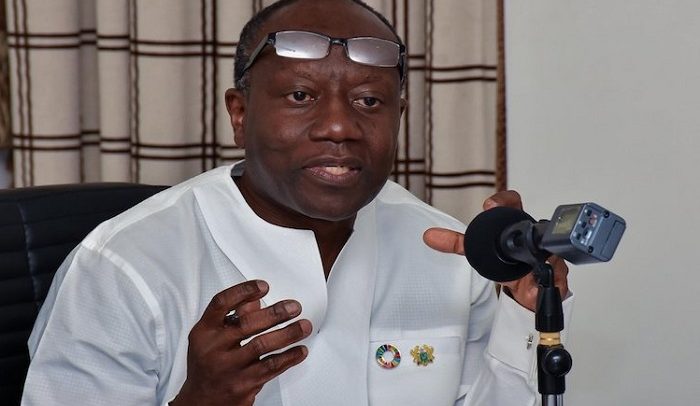Ken Ofori-Atta
A lawyer at the Jubilee House, Kow Esuman says the government has given a listening ear to calls by Ghanaians to reduce the rate of the proposed 1.75% Electronic Transaction Levy (E-Levy) to lessen the overall impact.
According to him, the reduction of the levy from 1.75% to 1.5% is consistent with the government’s commitment to give all ears to the sentiment of Ghanaians as expressed when the levy was announced, and ease the burden of people who will feel the squeeze of the hike in charges of electronic transactions.
“The E-Levy rate was 1.75%. Ghanaians complained and Government negotiated with the Telcos to ease the burden on Ghanaians, which resulted in a 0.25% reduction on the Telcos end. Government has listened further and reduced the rate by another 0.25% resulting in a net E-Levy rate of 1.25%,” he stated in a post.
The government has slashed the proposed 1.75% of the E-Levy by 0.25%, after stakeholder consultations, including the Minority NDC MPs, on the proposed tax.
Mr. Essuman said, “The sad thing about the vigorous opposition to the E-Levy by the Minority is that it is purely political and not in the interest of Ghana.”
E-Levy Consideration
Parliament is expected to consider the Electronic Transfer Levy Bill, 2021, which faces strong opposition from the National Democratic Congress (NDC) lawmakers, for passage this week when the House resumes sitting on Tuesday after months of legislative setbacks.
It appears now that getting the needed number of 138 House members to agree on the bill will be an achievement for the Majority side and the government of Nana Addo Dankwa Akufo-Addo in the hung parliament with the absence of Speaker Alban Sumana Kingsford Bagbin from the shores of the country.
Mr. Bagbin is currently in the United Arab Emirates seeking medical review, barely a week after he returned from Dubai where he had gone to receive medical attention.
The latest medical trip to Dubai is Mr. Bagbin’s third since he was sworn into office as Speaker early last year, and the consistency of it has set tongues wagging with suggestions that it could be an attempt to undermine the approval of the E-Levy Bill, knowing the closeness of the numbers in Parliament between the opposing parties.
Last Friday, an attempt to push through the bill for consideration by the House before Speaker Bagbin could leave for his Dubai trip suffered a jot when it became clear the needed number of 138 House members to agree on the bill would be an uphill task.
The Majority Leader, Osei Kyei-Mensah-Bonsu had told the House the legislation could be considered if “ongoing consultations” turned out to be positive.
“There have been some consultations, which began yesterday (referring to Thursday). The consultations are concluding, and if they conclude positively then perhaps we can consider the E-Levy today. If we don’t conclude positively then it will go to next week,” he stated at the House floor.
But the Minority Leader, Haruna Iddrisu, whose side had indicated its intention to vote against the bill, noted that the NDC Minority would insist for the question to be put on the motion, if the House was forced to commence the debate on the E-Levy, after they had raised red flag about the timing for the debate.
Mr. Kyei-Mensah-Bonsu then moved for adjournment which was seconded by Mr. Iddrisu, with the First Deputy Speaker, Joseph Osei-Wusu, who was in the Chair, adjourned the sitting to Tuesday, February 1.
The government last year announced the introduction of the Electronic Transaction Levy (E-Levy) in the 2022 budget with the aim to “widen the tax net and rope in the informal sector.”
The proposed levy, which is a charge of 1.75% of the value of electronic transactions, is to cover mobile money payments, bank transfers, merchant payments, and inward remittances, according to the Finance Minister, Ken Ofori-Atta.
The originator of the transactions will bear the charge except for inward remittances, which will be borne by the recipient, and the minister said there is an exemption for transactions up to GH¢100 per day.
By Ernest Kofi Adu


